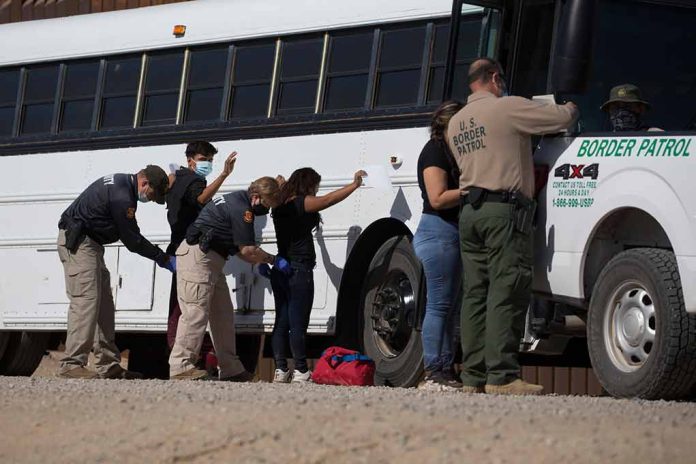
Mexican truck drivers operating illegally on B-1 visas are decimating the American trucking industry, causing U.S. companies to shut down operations and lay off workers as they’re unable to compete with the drastically lower wages.
Key Takeaways
- Foreign drivers with B-1 visas are illegally transporting domestic freight within the U.S., violating cabotage rules intended to protect American jobs.
- This illegal practice has driven freight rates lower, forcing American trucking companies out of business as they cannot compete with the significantly lower wages paid to foreign drivers.
- Both U.S. and Mexican carriers are exploiting loopholes by creating shell companies to facilitate the illegal employment of B-1 visa holders for domestic hauls.
- The American Trucking Associations (ATA) is pushing for stronger enforcement of cabotage rules and has urged the Department of Transportation to address the growing crisis.
- President Trump has reinstated federal English language proficiency mandates for commercial drivers to address safety and national security concerns related to foreign drivers.
American Trucking Companies Crushed by Illegal Foreign Competition
The American trucking industry is facing an existential threat as Mexican truck drivers operating on B-1 visas illegally transport domestic freight within the United States. While these visas legally permit drivers to deliver Mexican cargo to U.S. destinations, they explicitly prohibit hauling domestic freight between U.S. points. This systematic violation of cabotage rules has created a deeply uneven playing field where American companies cannot compete with the significantly lower wages accepted by foreign drivers.
“I closed in December, because I saw what was going to happen now. There was no reason to try and keep up with the B-1 drivers’ nonsense. No one really understands what’s happened, and there’s too many interests in between,” said Reed, one trucking company owner who was forced to shut down his business.
The scale of the problem is staggering. Along major transportation corridors like I-35 from Laredo, Texas, the overwhelming majority of trucks now employ B-1 visa holders. According to one fuel hauler who witnessed the transformation firsthand: “Look at I-35 coming out of Laredo: All you see is the Mexican trucks coming across going north, and nine out of 10 trucks are B-1 drivers; it’s just getting out of hand.”
Sophisticated Schemes Undermine Enforcement
The problem extends beyond simply hiring foreign drivers for domestic routes. Investigations have revealed sophisticated arrangements where U.S. companies establish shell operations in Mexico, or Mexican carriers create U.S. subsidiaries, specifically to facilitate the illegal employment of B-1 visa holders. These elaborate corporate structures make enforcement challenging and enable widespread circumvention of labor laws meant to protect American workers and maintain safety standards.
Bob Costello, chief economist for the American Trucking Associations, has been blunt about the illegal nature of these operations: “If you are using Mexican B-1 drivers to haul domestic loads, that is illegal. It’s another reason why the market has been bad.”
The issue has grown so severe that it’s now affecting the freight industry in Mexico as well. Mexican drivers are leaving their domestic jobs for better-paying, albeit illegal, opportunities with U.S. carriers. This creates a cyclical problem where economic pressures in both countries continue to fuel the illicit practice despite its clear violation of U.S. immigration and transportation laws.
Industry Response and Trump Administration Action
The American Trucking Associations has been vocal about the need for stronger enforcement. ATA President Chris Spear has called for bolstered safety monitoring to address the crisis: “FMCSA’s safety monitoring and enforcement must be bolstered to eliminate fraudulent CDL training providers.”
The American Transportation Research Institute (ATRI) has placed cabotage violations among its top five research priorities for 2025, highlighting the severity of the issue. The organization plans to investigate the economic impact of these violations and their threat to U.S. trucking jobs. Law enforcement could potentially implement checks at weigh stations to verify that B-1 visa holders are operating within their legal limitations.
President Trump has taken decisive action by signing an executive order titled “Enforcing Commonsense Rules of the Road for America’s Truck Drivers,” which reinstates federal English language proficiency mandates for commercial drivers.
This executive order addresses both safety concerns and the economic impact of foreign drivers operating illegally in the United States. The administration is also working with the Department of Homeland Security and Immigration and Customs Enforcement to crack down on B-1 visa misuse, ensuring that American trucking jobs are protected from unfair foreign competition that undercuts wages and working conditions.
Safety Concerns Mount as Enforcement Lags
Beyond the economic impact, safety incidents involving foreign drivers have raised additional alarms. Recent incidents include a fatal accident in Kentucky and property damage in Ohio, raising questions about whether drivers unfamiliar with U.S. roads and regulations pose increased safety risks. The American public bears the costs of these accidents, while trucking companies exploiting B-1 visa holders continue to profit from the regulatory gap.
As the trucking industry struggles with rising insurance costs and increasing regulatory burdens, the unfair advantage gained by companies employing B-1 visa holders for domestic routes threatens to fundamentally reshape the American transportation landscape. Without immediate and decisive enforcement action, more American trucking companies will likely face closure, with devastating consequences for the workers who depend on this vital industry for their livelihoods.









